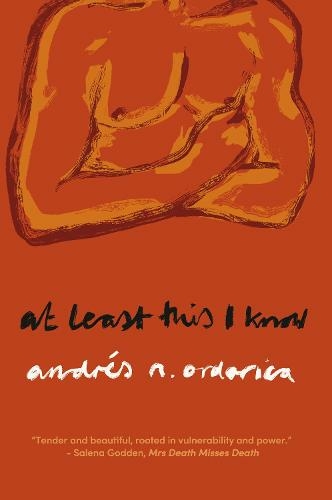At Least This I Know
Andrés N. Ordorica
(404Ink, 2022); pbk, £9.99
What does it mean to belong somewhere? In a body, in a family, in a writing group, in a country? These are the questions that inhabit this debut collection from Andrés N. Ordorica, a queer Latinx poet now based in Edinburgh, having lived in Mexico and the USA. The poems come in a variety of forms and shapes from the three single-word column ‘Word Association: Gay’, a poem that seems to ask to be read randomly despite its ordered lines or the surprisingly, solemnly centre-aligned ‘Ceremony; Or a poem for my writers group’ with its brew of colours and flavours:
If you took our community, steeped us all in one copper container,
what would the drink taste like?
The poems are ordered into six short segments, with each title a declaration, as if laying out the evidence for a life: ‘Where I begin; How I have grown; What I have lost; What I have given; He that I love; Where I will burn.’ These titles are poetry in their own right, conjuring up images of objects turned out of pockets and placed individually into plastic bags at airport security. Fitting then, that the first poem is set at a Scottish immigration desk. Andrés’ nervous declarations in this opening poem set the tone for this at times heart breaking collection teetering on the edge of belonging:
Sir, would you like a glass of water?
I am ready for immediate patriation.
I am ready for belonging.
I am ready.Please have a seat, sir, and someone will be with you shortly.
But of course there is not just displacement here. There are moving moments of reconciliation with a life punctuated by migration and the bittersweet work of love at great distances. ‘Si Dios Quiere’ is a gorgeous poem meditating on a grandmother’s response to the news that her grandson is planning a visit. The poem unfurls from a phone call into a meditation on what exactly God might want from the poet:
If God wants, They would want me
to exist forever so Abuela always has someone
on the other side of an unbreakable line,
waiting to greet her like a son that never sets.
Then there is the love story and the discovery, and adoption of a new country. The short poem ‘Bennachie’ near the end of the collection speaks simply to the feeling of experiencing a sense of belonging through the one you love ̶ the quiet complexity of this very specific experience: ‘I longed to know a land like that[.]’ But how sweet the memories, the sense of familiarity gained in the realisation of an unfolding love story:
We drank tea from a flask
atop Bennachie, remember?
These poems chart a life, each poem a mini memoir in verse. At least this I know gathers together wide-ranging themes of nationhood, sexuality, loss and activism but its protagonist, the poet, is the constant. In that sense, and helped along by those poignant section headings, the collection can be read cover to cover as an unfolding story in a way many poetry collections cannot do with such ease. This is a lovely way to gather together a first collection. By the final poem, the reader is nudged into wondering what treasures might we discover in a second collection.
Ellie Julings


Leave a Reply